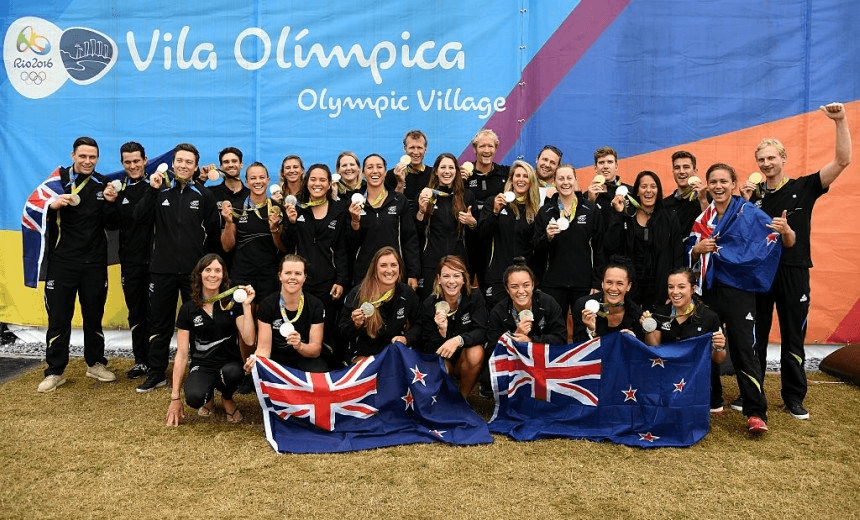The Rio Olympics are over, but how can we keep up our medal run in Tokyo? Madeleine Chapman says we have to invest more into female athletes.
The 2016 Rio Olympic Games were the first where New Zealand sent more female athletes than male to compete. Linked: it was also our most successful Games ever, with 18 medals in total: four gold, nine silver, and five bronze. Of our 18 medals, 11 were won by women or women’s teams. Some of the biggest moments for New Zealand were Eliza McCartney’s stunning bronze, Lisa Carrington’s gold and bronze double, and the Women’s Sevens team’s run.
READ MORE GOOD OLYMPICS WRITING:
Rio 2016: Reflecting on Eliza McCartney’s astonishing rise
In 2008, New Zealand men won seven medals. In London 2012 they won eight. This year they won seven. As for the women? In 2008, they won two. In 2012, five. And now 11 in Rio.
These statistics are no surprise, as sportswomen have been experiencing a slow increase in funding and opportunities over the past decade. There’s still a long way to go until they’re anything like level-pegging with men, but that hasn’t stopped them surpassing their male counterparts in Olympic achievement. Women already win more medals, at a lower cost per medal, than men. Put it all together and it leads to a cold, unavoidable conclusion: women are a better Olympic investment than men.
Look at the figures. In the Herald’s ranking of each sporting body’s performance in Rio, cycling and swimming came out as the least efficient investments for our funders, while sailing and athletics exceeded expectations by bringing home four medals apiece. But what’s more telling is that the “cheapest” of the medals – those won in sports that received the least funding – were all won by women.
Luuka Jones came away with a silver in the canoe slalom, despite her sport receiving less than $1m in funding since 2012. Lydia Ko brought home a silver with golf’s $457,000 in funding, though her professional status no doubt affects funding decisions. But the greatest return on investment was Natalie Rooney, who won silver in trap shooting. Shooting received $101,000 in funding this Olympic cycle, with Rooney herself getting a campaign grant of $20,000 earlier this year. One can assume that money went to her training in Italy prior to the Games and her impressive performance represents an incredible return on a measly investment from High Performance Sport New Zealand.
Even the Women’s Sevens team received 75% of the funding that the men’s team did. Look how that turned out.
It seems New Zealand’s female athletes are able to succeed even while being underfunded. This is hardly a surprise given that women’s sport has always been underfunded in New Zealand and is often derided by the public and sports writers like Stuff’s uber-troll Mark Reason. .
And yet, while many (sadly) agreed with Reason and his claim that women’s sport rides on the coat-tails of men, nobody suggested Eliza McCartney’s bronze medal was worth less than Tomas Walsh’s. Nobody said Valerie Adams should be less happy with her silver medal because men throw a heavier shot put. And nobody told Lisa Carrington to thank the male kayakers for her success.
Of course they didn’t, because it’s the Olympics and in the Olympics, a medal is a medal. We feel great pride in each and every one that a New Zealand athlete wins, regardless of their gender or the sport. And if medals are what we love, then the cost of each one should be evaluated. Is a shooting silver ($101,000) worth $26m less than a cycling silver ($26.471m)?
Now, I’ll be the first to admit that I only watch the shooting during the Olympics. But in the interim years, I don’t violently oppose trap shooting as a concept. Unfortunately, the same cannot be said for those who relish women’s Olympic achievements and then leave a trail of insane bile on any article (like this one) suggesting that they might deserve more funding/coverage/anything in the years between medals.
The fact is, when assessing the 2016 Olympics through a cold, subjective, prism, medals won by women cost New Zealand a lot less money.
The real question then is this: how much do New Zealanders care about Olympic medals? Because as far as cost-benefit goes, female athletes are by far a better investment. And if they’re the better investment, maybe they should be more of a focus moving forward when it comes to funding. Who knows what might happen then? Perhaps Tokyo 2020 would surpass Rio.
That would be great. But to make it happen, New Zealanders need to value female athletes as much as we value our men. Perhaps even throw some money and encouragement their way in the years when the Olympics aren’t on TV 24/7. Let’s support women in sport for all four years of the Olympic cycle, not just the final two weeks.




